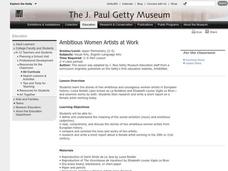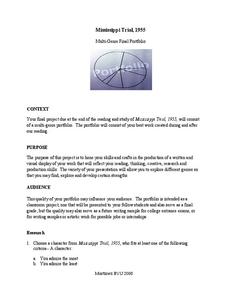Howard Hughes Medical Institute
Survival of the Fittest - Variations in the Clam Species Clamys sweetus
It's not often that you come across a clever laboratory activity that is both imaginative and comprehensive! Using M&M's and Reese's peanut butter candies to represent two different clam species, young biologists test for "relative...
American Physiological Society
Drug the Water Flea
This is a flea. This is a flea on drugs. Any questions? Your class will have questions aplenty during an impactful experiment. Lab groups get to know Daphnia magna, the humble water flea, and study the effects of stimulants and...
American Physiological Society
Hoo Eats Who and What is What in Your Own Backyard?
Bird is the word! Teach life science scholars the importance of our feathered friends and the roles they play in our ecosystem. Using the plan, learners investigate the birds in their areas, determine the biotic and abiotic factors that...
American Physiological Society
Sticky Adaptations A Lesson on Natural Selection
Now you see it, now you don't! The stick bug exhibits the ability to disappear into a wooded environment. Why does this adaptation manifest in some species, but not in others? Life science students explore animal adaptations in nature...
American Physiological Society
Effects of Environment on Enzymes
Much like the tale of Humpty Dumpty, proteins, once altered, will never be the same again. Honors and pre-AP biology classes explore the delicate world of enzymes via a Webquest and lab experiment. The teacher's guide contains all...
Curated OER
Integrating Character Education into Lesson Plans
Students select a favorite lesson and list character traits from that lesson to serve as indicators on various questions under review. Character traits included are honesty, compassion, strong work ethnic and respect for the environment.
Stanford University
Civil Rights or Human Rights?
Young citizens consider the American civil rights movement as part of the global struggle for human rights. After using a timeline activity to learn about the major events in the civil rights movement, class members study Malcolm X's...
IOP Institute of Physics
Physics in Concert
What do physicists and musicians have in common? A lot more than you might think. After first viewing a slide show presentation and completing a series of skills practice worksheets on the physics of light, sound, and electricity, young...
Curated OER
Listening To The Prairie
Students investigate the concept of agriculture and how it is part of the ecology and economy of the United States. They participate in a number of different classroom activities intended to raise agricultural awareness. The activities...
Curated OER
Innovation and Entrepreneurship in the Classroom
Inspire critical thinking and facilitate collaboration with opportunities for entrepreneurial innovation!
abcteach
Flowers for Algernon, by Daniel Keyes
Looking for materials to accompany your study of Flowers for Algernon, by Daniel Keyes? Look no further! Included here is everything you need to go alongside your unit: worksheets, graphic organizers, writing assignments, an assessment,...
NET Foundation for Television
1850-1874 Beef Moves to Nebraska
Just how long was the Long Drive? Learners investigate the movement of cattle in the Great Plains during the mid-1800s. They incorporate photographic, newspaper, video, and primary source evidence into their posters, artwork, and written...
Mascil Project
Circular Pave-Stones Backyard
Pack the instructional activity into your plans. Young mathematicians learn about packing and optimization with the context of circular paving stones. They use coins to model the paving stones, and then apply knowledge of circles and...
Curated OER
Living Yesterday's History Today
Students describe and contrast life as it was in colonial days. They plan, compose, and produce a student movie. They reflect on what they have learned. They share their experience with others in digital format.
Curated OER
Ambitious Women Artists at Work
Examine the works of Luisa Roldan and Elisabeth Louise Vigee Le Brun. Learners view various pieces of art from each of the artists and read about their lives. They discuss the information and construct a Venn diagram, comparing the two...
Curated OER
Reading Comprehension 7: Level 12
A passage about the changing role of home economists provides the text for a reading comprehension strategies worksheet. Learners must summarize, draw inferences, identify the main idea, and use context clues to determine the meaning of...
Curated OER
Mississippi Trial, 1955: Culminating Writing Project (Multi-Genre Final Portfolio)
Designed as the final project concluding a study of Mississippi Trial, 1955, readers select a character from Crowe's novel and craft a portfolio of six entries that reveal not only aspects of the character, but similarities between the...
NASA
The Case of the Wacky Water Cycle
Join the tree house detectives in learning about the processes of the water cycle, water conservation, water treatment, and water as a limited resource.
American Physiological Society
Thermal Insulators: Keep it Hot!
There's nothing like a cup of hot chocolate on a chilly winter's day. Except for when that hot chocolate quickly becomes lukewarm chocolate ... or even cold chocolate. What material provides the best insulation to keep the chocolate from...
American Physiological Society
Did I Observe it or Infer it?
Take the mystery out of inquiry! When young scientists learn to use their keen powers of observation to make smart inferences about a situation, they are well on their way to understanding what the scientific method is all about. Using...
American Physiological Society
It’s the Heart of the Matter
Get the class jumping for joy with a fascinating look at matters of the heart. Learners perform physical tasks, collect and analyze heart rate data, and study conditions that affect heart health. Use the action-packed lesson plan to...
American Physiological Society
What Environmental Conditions Lead to the Hatching of Brine Shrimp?
Will changing the environment in which brine shrimp live impact their reproductive success? Young scientists get hands-on experience studying the habitat of brine shrimp in a two-week immersion instructional activity. The teacher's guide...
American Physiological Society
How Does the Density of a Liquid Affect the Buoyancy of an Object?
Here's a lesson plan that will really float your boat! Introduce physical science scholars to the relationship between buoyancy and density through an assortment of individual and collaborative exercises. Lab groups work together to...
American Physiological Society
Why is Kettle Corn Cooked in Copper Pots?
The kitchen — it's not just for eating anymore! Specific heat is often a difficult concept to grasp, so give it context by relating it to cooking. Learners gain experience in the principles of thermal energy transfer by designing an...

























